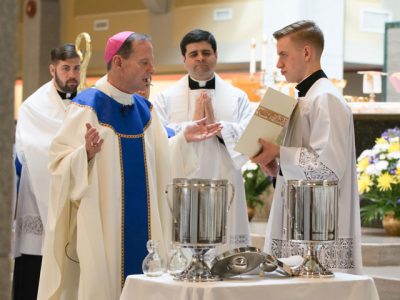 On Thursday of Holy Week, the priests of the Arlington Diocese and many of the lay faithful will gather with Bishop Burbidge for the annual diocesan Chrism Mass at the Cathedral. In non-pandemic times, many of the lay faithful also join them for the celebration in which the sacred oils are prepared and blessed by the Bishop.
On Thursday of Holy Week, the priests of the Arlington Diocese and many of the lay faithful will gather with Bishop Burbidge for the annual diocesan Chrism Mass at the Cathedral. In non-pandemic times, many of the lay faithful also join them for the celebration in which the sacred oils are prepared and blessed by the Bishop.
At the Chrism Mass three separate urns of oil are offered by the faithful and presented to the bishop for the blessing—the Oil of the Catechumens, the Oil of the Sick, and finally the Oil for the Holy Chrism. The Chrism Oil is mixed with fragrant balsam, and, because of its prominent place in the rites of Christian Initiation and Holy Orders, it is blessed with a prayer of consecration. Each of the oils is used as part of an anointing during a sacramental celebration.
The very action of “anointing” is connected to Jesus. In Hebrew the word Messiah; in Greek, Christos are translated into English as Christ. No matter what the language, the word means “the Anointed One.” In Luke’s gospel the anointed one is the fulfillment of Old Testament prophecy from Isaiah. Reading from the prophet during a synagogue service, Jesus reads: “The Spirit of the Lord is upon me, because he has anointed me to bring glad tidings …”. Then, as the Gospel of Luke tells us, while “the eyes of all in the synagogue looked intently at him, he said to them, “Today this Scripture passage is fulfilled in your hearing’” (see Luke 4:16-21). Jesus the Christ, the Anointed One: this title of our Lord anticipates the continual outpouring of God’s mercy through the sacramental anointing with oil in the liturgies of the church.
For its abundance, its scriptural history, and its healing properties, olive oil is specified for sacramental use. From ancient times the prophets, priests and kings of Israel were anointed with olive oil as a sign that the Spirit of God rested upon them (see Isa. 61:1; Ex. 30:30; I Sam. 10:1).
Anointing with the sacred oils is integral to several of the sacraments and other rites of the church. An infant presented for baptism is anointed with Oil of the Catechumens before the baptism, with the prayer for the protection against the powers of sin and evil. An adult preparing for Baptism at the Easter Vigil (a catechumen) may receive this anointing several times during the time of preparation. The Oil of the Sick is used in the sacrament of anointing, during times of illness or before surgery; sometimes also during the sacrament of viaticum (commonly referred to as “Last Rites”; see James 5:14-15).
The Sacred Chrism is an integral part of the sacraments of Baptism, Confirmation and Ordination. Named after Christ himself (chrism = “Christ-ing”), it bestows a share in Jesus’s own anointing with the Holy Spirit. Just following the baptismal pouring of water, the baptized infants are anointed on the crown of the head, signifying the royal dignity, the prophetic vocation, and the call to holiness of all the baptized. Again, at confirmation the candidate is anointed on the forehead as the bishop says, “Be sealed with the gift of the Holy Spirit.” When a bishop ordains a man to the priesthood, following the imposition of hands and the prayer of consecration, he anoints the hands of the priest with the Sacred Chrism, saying: “The Father anointed our Lord Jesus Christ through the power of the Holy Spirit. May Jesus preserve you to sanctify the Christian people and to offer sacrifices to God.”
Following the Chrism Mass, the sacred oils are distributed to representatives of every parish in the diocese for sacramental use during the ensuing year. The oils are normally received by the parish in a simple rite as part of the Mass of the Lord’s Supper on Holy Thursday. The oils are reserved in the Ambry (Latin: armārium – a storage place), located near the tabernacle at St. Francis.
So…now you know.